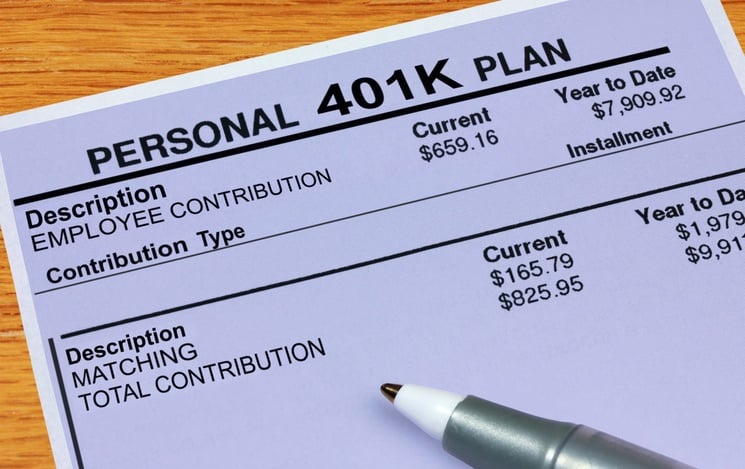My Big Retirement Planning Mistake, and How You Can Avoid It

Retirement planning | iStock.com/designer491
Job hopping is the new normal. The average person will change jobs a dozen times over their career, according to the Bureau of Labor Statistics, sticking with their employer for less than five years on average. Whether those career moves are welcome or forced, they’re almost always disruptive, especially when it comes to retirement planning.
I know from experience. The last time I changed jobs, I made a rookie retirement planning mistake, one I could have easily avoided if I’d taken some initiative. Now, I’m paying the price for my laziness.
If you’re lucky enough to have a 401(k) or similar retirement plan, you may already know that if you leave your job, you have to decide what to do with your savings. You might cash out, roll the money over to an IRA or your new employer’s 401(k), or simply leave it where it is.
I figured rolling my 401(k) over to my existing IRA was the best option. Cashing out meant having to pay penalties and taxes, which I wanted to avoid. The account balance was relatively low, and I couldn’t see any advantage to sticking with the current plan administrator. A rollover meant all my retirement savings would be with the same custodian, which had lower fees and more investment options than my 401(k). But I didn’t do that. Instead, I left my 401(k) where it was. Big mistake.

Throwing money away | Paramount Pictures
I’d gone through a rollover in the past, so it wasn’t that I didn’t understand what to do. A phone call and some paperwork would have been enough to set the process in motion and consolidate my retirement savings.
Yet “rollover 401(k)” lingered on my to-do list for months. Why? I hate talking on the phone, for one. I was busy. It didn’t seem that important. Besides, the money seemed to be doing fine right where it was.
But my money wasn’t fine. It turned out my old 401(k) plan administrator didn’t want anything to do with my little retirement account.
Where did my money go?

Confused person holding money | iStock.com/Alen-D
I write about personal finance and retirement for a living, and I consider myself fairly money savvy. So, I was pretty shocked when about 18 months after switching jobs, I received a letter from a company I’d never heard of telling me they had the money I’d saved for retirement when I was with my previous employer. I had no idea a third-party could swoop in and scoop up my retirement savings without my OK. But that’s exactly what happened.
Naturally, I was more than a little suspicious. Who were these scam artists, and did they really have my money? But a little research revealed I wasn’t dealing with a scam, at least, not exactly.
The company that had my 401(k) savings was in the business of gobbling up left-behind retirement accounts, taking them off the hands of 401(k) providers who no longer wanted to deal with them. They stepped in, grabbed the money (and collected some fees in the process), and then dumped it into a cash account. The company didn’t even provide an option to invest the funds, which meant the actual value of my savings would steadily shrink because of inflation, while the fees they charged chipped away at my savings even more.
If I wanted to salvage my savings, I needed to do what I should have done in the first place: move the money into my IRA. In theory, that should be a fairly simple transaction. In practice, it’s proving to be quite a hassle. The paperwork is confusing. Special signature verifications are required. I need to fax someone a copy of my driver’s license. And so on.
I can’t really complain too much. All of this could have been avoided if I’d just had my act together and rolled over the money right after I left my last job. Fortunately, the amount involved is relatively small, so this oversight isn’t seriously jeopardizing my future. But my retirement planning mistake has taught me an important lesson about staying on top of your finances.
What you need to do when you change jobs

401(k) statement | iStock.com/GaryPhoto
If you have money in a 401(k) or other retirement account when you change jobs, you need to make a decision about what to do with those funds. In general, you have three options:
Cash out: In most cases, cashing out your 401(k) is one of the dumbest financial moves you can make. For one, you’ll pay a 10% penalty for an early withdrawal if you’re younger than 59½. And if you have a traditional 401(k), your plan administrator will usually withhold 20% of your balance for taxes. So, if your 401(k) is worth $25,000, you might get a check for $17,500 after taxes and penalties, a loss of $7,500.
Cashing out also leaves you playing catch up with retirement savings. Withdrawing your money means you’ll lose out on future investment growth, which can translate to tens of thousands of dollars less when you retire.
Roll it over: Moving your money from a 401(k) to an IRA when you change jobs is another option. Transferring the funds has several advantages. You’ll usually have more control over your investments and the fees you pay. Customizing your beneficiary designations may also be easier, according to Dan Moisand at Marketwatch.
If you are going to roll over your 401(k), opt for a direct rollover if possible. In this transaction, your 401(k) plan administrator sends the money directly to your IRA custodian. You never touch the funds, avoiding taxes and penalties. In an indirect rollover, the plan administrator sends you a check, which you deposit in your IRA. In that case, taxes may be withheld, and you could get hit with penalties if you don’t complete the transaction within 60 days.
Some people might want to roll over a traditional 401(k) to a Roth IRA to take advantage of tax-free investment growth. You’ll have to pay taxes on the money you convert to a Roth, though. If you’re interested in this option, talk to a financial advisor or tax pro so you understand the pros and cons of a Roth conversion.
Leave your money where it is: Despite my experience, leaving your money in your 401(k) isn’t always a mistake. If you’re holding company stock in your retirement plan, want to shield your money from creditors (in certain states), or know you’ll want to tap your savings early, sticking with your 401(k) may be the best option, according to Bankrate. If you think you want to leave your money where it is, talk to your 401(k) administrator to make sure they don’t require you to cash out or roll over your savings. If your new employer offers a 401(k), you may also be able to transfer your savings to the new plan.

Retirement savings | iStock.com
Bottom line: If you change jobs and have retirement savings, you need to decide what to do with your money. Each option has pros and cons depending on your particular situation. You also need to consider fees, investment options, and performance when deciding who should manage your money. If you’re not sure what you should do, talk to a financial advisor who can provide personalized guidance.
What you shouldn’t do is make the same retirement planning mistake I did: doing nothing out of sheer inertia. Ignoring the issue is a recipe for disaster, especially if you forget about the account or your plan administrator decides it no longer wants your business, and your savings end up in retirement account limbo.
No comments:
Post a Comment